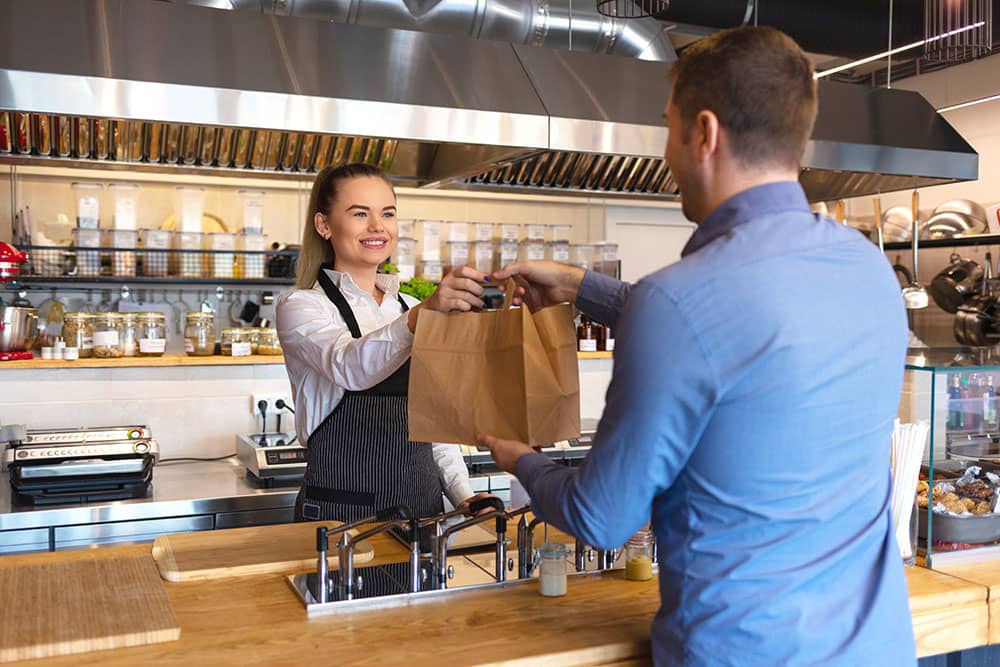As a business owner, you have a multitude of concerns to look after every day. The insurance cover for your takeaway business should not be one of them. At Grace Insurance, we excel at providing our clients with the professional assistance needed to determine what type of cover is necessary.
Whether you own a small fish and chip shop for takeaway orders only, or if you have a small dining area in your takeaway, as the owner, you still shoulder a virtually unlimited amount of responsibility for what occurs on your premises or in relation to your products.
There are several common fallacies or myths that surround takeaway shops and the need for insurance. Here are the top three myths that need addressing:
-
- My business is tiny, and customers get their food then leave. I do not need to carry much insurance cover.Even if your customers spend a few minutes under your awning, there are a number of things that can happen which you are liable for, including:
- Trips Slips and Falls – All it takes is an errant extension cord or a turned up corner of your welcome mat, and before you know it, you are liable for medical care, pain and suffering, lost wages, physiotherapy. The list is nearly endless.
- Bad Food – Of course, you take pride in your food quality, but unavoidable mishaps happen, and customers can become ill. Even if you and your employees handle food properly, a single misstep in the supply chain and your products can be contaminated. Should this occur, you are liable for your patrons’ medical care, which can add up to an immense amount of money.
- My shop is in a safe location, and I do not need to worry about natural disasters closing my doors.Even if your location is historically safe, natural disasters are not the only reason for business interruptions:
- Burst pipes
- Large scale equipment failure
- A fire in a neighbouring shop
- A bizarre accident where a driver crashes their car through your front window
- I employ good people who would never steal from me.It is reasonable to expect that the people you hire will do what is right and be honest in their dealings. Unfortunately, this is not always the way things happen. Even a good person can make terrible choices that end up costing you significant sums of money.
Additionally, theft can come from other unscrupulous sources such as delivery people, maintenance workers, or customers.
- My business is tiny, and customers get their food then leave. I do not need to carry much insurance cover.Even if your customers spend a few minutes under your awning, there are a number of things that can happen which you are liable for, including:
This list of the top six types of insurance claims for takeaways and small restaurants highlights the need for proper insurance cover.
-
- Breakdown of Equipment – This issue can range in severity from the heating element of a fryer malfunctioning to a refrigeration issue that ruins thousands of dollars in product
- Storm and Fire Damage – The unfortunate reality that some events are beyond your control no matter how well you plan
- Broken Glass – Whether from vandals or an accident, shattered glass happens frequently and can be expensive to repair
- Theft – Millions of dollars are lost to theft each year, and regardless of whether it is in-house or an outside job, it can devastate a business
- Back in Business – Unexpected events that force owners to close up shop happen every day. Guarding against these losses is critical for those in business
- Money – Protecting your business and your income is paramount to those who operate takeaways
Case Studies
Example one: Myles runs a popular fish and chip shop. He received a supply of tainted fish that he unknowingly prepared and served to customers. Five of his regular customers became severely ill after consuming the fish. Because of his takeaway insurance, Myles covered the customers’ medical costs as well as reparations that totalled over $5,000 for each customer. Without the cover, he could have easily lost his business through no fault of his own.
Example Two: Dean added a small outdoor patio to his pizza shop, and he was careful to inform his insurance expert of the change. His patio awning blew down, breaking the arm of a patron. Fortunately, because Dean instructed his insurance professional to include the dining area on his takeaway insurance, the customer’s expenses did not come out of Dean’s pocket.
What kinds of optional business insurance should I consider for my takeaway shop?
In addition to the mandatory worker’s compensation and public liability insurance cover (required in many circumstances), here are several types of insurance cover designed to protect you and your takeaway shop from numerous unforeseeable events.
- Product Liability – Being in the business of serving food and beverages, a product liability policy is a critical protection from claims against you by customers
- General Liability – An umbrella policy that is a wise investment to guard you against unforeseen events
- Property Contents Insurance – One mishap can create a chain of events that has the potential to ruin you. Whether it is a natural disaster, a fire, or another type of calamity, a Property Contents policy covers the financial hit you will experience from such misfortune
- Equipment Breakdown – All of the very best recipes and ideas in the world cannot help your business if you lack the equipment to create them. This policy will cover the cost of repairs to replacement of fixed equipment that is not functioning
- Deterioration of Stock – This policy will cover the cost of spoilage that occurs because of a malfunction
- Business Interruption – Events that are out of your control can lead to a work stoppage. A Business Interruption policy will cover the costs of operating expenses whilst your business is inoperable
- Theft – This policy protects your assets from employee dishonesty, robbery, or damage of money in a fire, during a holdup, or in transit
Running a successful takeaway shop consumes most of your time and energy. Do not add shouldering the burden of planning your insurance cover to your already limited schedule. Contact the professionals at Grace Insurance and relax, knowing they have you covered.
*Please Note* The material in this blog post is for informational use only. It is not legally binding insurance advice and should not take the place of an individual consultation with an insurance professional.






